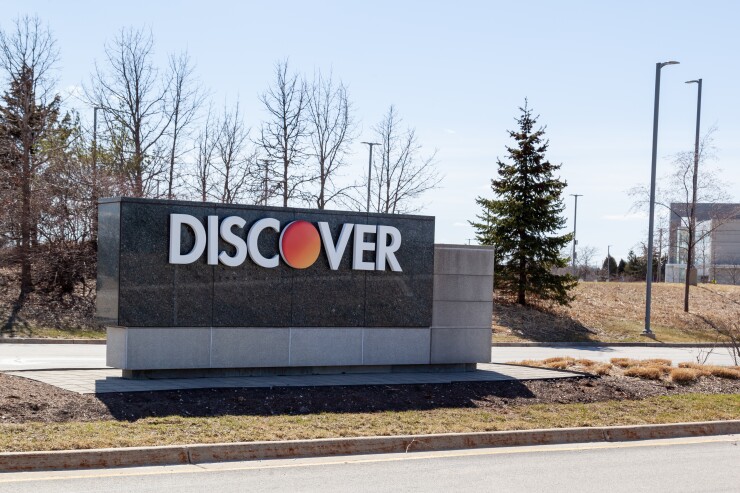
Even as Discover Financial Services operates under a cloud of regulatory compliance headaches that drove up costs in the third quarter, the company is moving back into a pre-pandemic credit cycle characterized by solid loan growth and rising charge-offs.
The Riverwoods, Illinois-based firm on Wednesday announced a 17% increase in overall loan growth for the quarter that ended Sept. 30, while charge-offs for the quarter reached 3.52%, a sharp increase from 1.71% during the same period a year earlier.
The firm's uptick in charge-offs was just 30 basis points higher than its second-quarter rate, and falls in line with historic norms after several quarters of unusually low pandemic-era charge-offs, Discover's Chief Financial Officer John Greene told analysts during a Thursday conference call.
Discover's payment services volume rose 9% during the third quarter, to $91.8 billion from the previous year, and its Pulse debit card network dollar volume alone rose 14%. The company credited the Pulse surge to pressure merchants applied to regulators to ensure that e-commerce transactions are subject to the same
Still, investor concerns about Discover's expanding loan-loss reserve and the company's inability to say when it plans to resume stock buybacks caused the company's stock to fall by about 7%, to $84 a share, by mid-Thursday.
Discover Interim CEO John Owen, who stepped in after the
The card network has also begun discussions with merchants to rectify a card misclassification issue in which Discover said it
Discover is still interviewing CEO candidates from an internal and external pool, and the company plans to announce a successor to Hochschild "in coming months," Owen said.
Overall consumer spending growth slowed to around 1% during the recent quarter in most categories, Greene said in an interview.
"Spending was reduced across the board, but it was significantly lower among consumers in lower-FICO bands. There was less of a spending decline among consumers with higher credit scores," Greene said.
As a result, Discover has tweaked its underwriting to accommodate growing risk segmentation within its portfolio. The company has also begun considering "off-credit-bureau" borrowing risk, which includes the effect of buy now/pay later loans from firms that don't report those loans to the bureaus, Greene said.
"We're seeing the effects of BNPL in our underwriting and although it's not significant, we're factoring it into our models now," he said.
Discover has also seen a slowdown of the so-called "revenge travel" trend that drove record airline and hotel spending during the first part of this year. It also saw a possible benefit from entertainment spending connected to Taylor Swift's 20-city Eras tour that wrapped up during the third quarter, driving
Travel spending growth during the third quarter fell to about 1%, from 20% growth during the first quarter of this year, while online spending growth hovered at 4% to 5% and discretionary spending was flat or in a decline, Greene said. He did not speculate on why entertainment spending rose.
Within Discover's overall loan growth, the firm saw a 25% increase in personal loans, a 16% rise in credit card loans and a 1% expansion of student loans. As a result, Discover had increased its loan-loss reserve rate to 7.06% at the end of the recent quarter, compared with 6.84% at the end of the second quarter, in expectation of further loan growth and the likelihood of rising credit losses.
The Federal Reserve this year began enforcing a rule requiring processors to provide all merchant transactions with a lower-cost debit network routing choice, which accelerated Pulse's debit card processing momentum. "We've expanded a number of contractual arrangements, and also debit choice routing has actually made a difference in volumes," Greene said.
Operating expenses during the third quarter included a 17% boost in professional fees due to heavy reliance on third parties as Discover works through its compliance issues.
Discover ended the quarter with total loans of $122 billion, up 17% from $105 billion a year earlier. Total revenue also rose 17%, to $4 billion from $3.5 billion during the same period a year earlier and net income was $683 million, down 33% from $1 billion at the end of the third quarter last year, due to higher expenses.
Analysts said Discover's franchise remains solid, despite its leadership hiccup and compliance issues.
"We believe that it is possible that a new CEO would begin to incrementally leverage Discover's global payment network, a key asset we believe may be underutilized, though we recognize it is key to Discover's impressive return on equity," said a team of analysts at New York-based William Blair in a Thursday note to investors.






